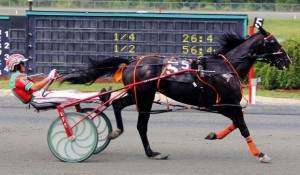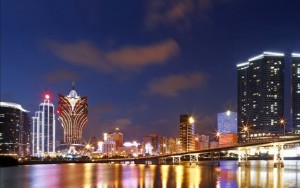As might be expected, MGM National Harbor‘s opening strapped a jet pack on Maryland casino revenues for December, which came in at $133.5 million, easily surpassing last May’s then-record $104 million. Wagering — as opposed to win — per slot per day at MGM was $313.60, while table game betting averaged $5,343.76.  Elsewhere, Horseshoe Baltimore operates with less than two-thirds the slot machines of Maryland Live but got bigger bang for its buck — a daily gross of $235 per machine versus Maryland Live’s $255.
Elsewhere, Horseshoe Baltimore operates with less than two-thirds the slot machines of Maryland Live but got bigger bang for its buck — a daily gross of $235 per machine versus Maryland Live’s $255.
Scarcely was the tape off the slots at MGM than the hypocrisy machine sprang into action. Politicians placed the blame for education-funding shortfalls not where it belongs — on themselves — but on casinos. One culprit has already fled the scene: ex-Gov. Martin O’Malley (D, pictured), who failed to insist that school budgets be indexed to increases in school financing. Other politicians are raiding the Education Trust Fund to underwrite infrastructure projects and government salaries. In the meantime, Baltimore‘s school district is looking at a $175 million shortfall over the next two years. “We’ve essentially invested the same amount of money in our schools that we would have with or without legalized gambling,” said Maryland Center on Economic Policy Director Benjamin Orr.
The devil was in the details of the enabling referendum, which didn’t require casino taxes go to schools on top of what was already being spent. “Even back in 2009, we knew they were going to do the Okey-Doke on us. We knew how the game was played,” said casino skeptic Del. Curt Anderson (D). As casino income has risen, state school funding has fallen. “People ask me often around the state, ‘What happened to the casino money? And I don’t have a good answer for them. It just disappears into the general fund,” adds State Comptroller Peter Franchot. Not entirely. It’s generated a $266 million subsidy for the horsey set. But the pot-calling-the-kettle-black award goes to Bebe Verdery, director of the Education Reform Project of the ACLU of Maryland.
“In this time of fiscal distress for Baltimore and other schools, why can’t part of the solution be casinos sharing more of their excess profits,” Verdery shrills. To which I ask, since Maryland casinos pay the highest tax rates in the country, why should they be expected to do more … and what defines “excess profits”? How much is exactly too much?
* Illinois gambling revenues rose almost $50 million last year — all at the expense of casinos, which continue to lose money to slot routes. Although the installation cycle has slowed, Illinois players wagered over $1 billion on the barter units in 2016, which vindicates Penn National Gaming‘s decision to get into the slot-route business itself.
* Seedy casino speculator Shawn Scott finally has a chance to legitimize himself, having resubmitted enough valid signatures to qualify for a referendum question. As before, the ballot is written so as to exclusively benefit a York County, Maine, track  owned by Scott. Funding for the ballot drive came entirely out of the pocket of his sister, Lisa Scott. But first the measure has to be vetted by the Legislature, which could take askance at Shawn Scott’s sleazy past, which included the sub rosa funding of a slot-parlor ballot initiative in Massachusetts last year. As for the Scotts, they are likely to argue, as Lisa already has, that this “project will protect tax revenues for the Maine harness racing industry – the owners, breeders, trainers, drivers and grooms that preserve the traditions and values of this valued agricultural industry – in addition to providing millions of dollars for health care and education,” to say nothing of keeping Maine gamblers closer to home. More likely, given his history, Scott will flip the racino at a big markup to a real casino operator.
owned by Scott. Funding for the ballot drive came entirely out of the pocket of his sister, Lisa Scott. But first the measure has to be vetted by the Legislature, which could take askance at Shawn Scott’s sleazy past, which included the sub rosa funding of a slot-parlor ballot initiative in Massachusetts last year. As for the Scotts, they are likely to argue, as Lisa already has, that this “project will protect tax revenues for the Maine harness racing industry – the owners, breeders, trainers, drivers and grooms that preserve the traditions and values of this valued agricultural industry – in addition to providing millions of dollars for health care and education,” to say nothing of keeping Maine gamblers closer to home. More likely, given his history, Scott will flip the racino at a big markup to a real casino operator.
* It hasn’t even been a week and already gaming-related issues are landing on President Donald Trump‘s desk. The latest is the possible resolution of an Internet-gambling contretemps that has already dragged on for 13 years. The U.S. bars online punters from access to sites in Barbuda and Antigua. The World Trade Organization weighed in a decade back, ordering the U.S. to pay $21 million. The two islands want $200 million. Evidently they’re unaware that Trump is a cheapskate. They’d be lucky even to get the 21 mil. If this exercise serves any purpose it might be to presage the Trump administration’s stance toward online gambling.
* Once Native Americans had spent enough time in apprenticeship to learn how to run  casinos on their own, The Man found himself persona non grata as a manager of tribal casinos. We mention this because a potential, even bigger sequel could play itself out in Macao. The local government is pressing for 85% of upper- and middle-level casino managers to be locals by the end of this year. “It seems there are over 100 non-local workers on resort facility management. And we have already told the gaming companies we will not renew those work permits,” warned lawmaker Wong Chi Hong. The contentious session was further highlighted by the accusation that casino concessionaires are hiring drivers from mainland China, in contravention of Macanese law.
casinos on their own, The Man found himself persona non grata as a manager of tribal casinos. We mention this because a potential, even bigger sequel could play itself out in Macao. The local government is pressing for 85% of upper- and middle-level casino managers to be locals by the end of this year. “It seems there are over 100 non-local workers on resort facility management. And we have already told the gaming companies we will not renew those work permits,” warned lawmaker Wong Chi Hong. The contentious session was further highlighted by the accusation that casino concessionaires are hiring drivers from mainland China, in contravention of Macanese law.

